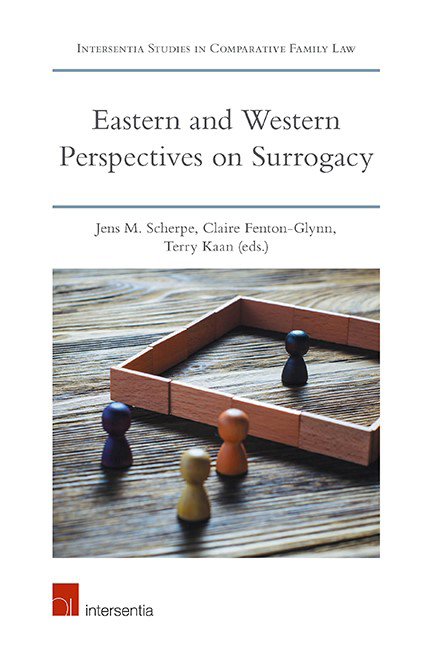Book contents
- Frontmatter
- Preface and Acknowledgements
- Contents
- List of Contributors
- Introduction
- Questionnaire
- PART I WESTERN PERSPECTIVES
- THE PROHIBITIVE APPROACH
- THE TOLERANT APPROACH
- THE REGULATORY APPROACH
- Greece
- Israel
- South Africa
- New Zealand
- Portugal
- Iceland
- THE FREE MARKET APPROACH
- THE INFLUENCE OF INTERNATIONAL COURTS
- PART II EASTERN PERSPECTIVES
- THE PROHIBITIVE APPROACH
- A TOLERANT APPROACH?
- REGULATION THROUGH PROFESSIONAL MEDICAL BODIES
- FROM FREE MARKET TO REGULATION
- PART III COMPARATIVE PERSPECTIVES ON SURROGACY
- Index
- About the Editors
Israel
from THE REGULATORY APPROACH
Published online by Cambridge University Press: 26 June 2019
- Frontmatter
- Preface and Acknowledgements
- Contents
- List of Contributors
- Introduction
- Questionnaire
- PART I WESTERN PERSPECTIVES
- THE PROHIBITIVE APPROACH
- THE TOLERANT APPROACH
- THE REGULATORY APPROACH
- Greece
- Israel
- South Africa
- New Zealand
- Portugal
- Iceland
- THE FREE MARKET APPROACH
- THE INFLUENCE OF INTERNATIONAL COURTS
- PART II EASTERN PERSPECTIVES
- THE PROHIBITIVE APPROACH
- A TOLERANT APPROACH?
- REGULATION THROUGH PROFESSIONAL MEDICAL BODIES
- FROM FREE MARKET TO REGULATION
- PART III COMPARATIVE PERSPECTIVES ON SURROGACY
- Index
- About the Editors
Summary
GENERAL LEGAL FRAMEWORK
LEGAL RULES RELATING TO SURROGACY
Israel was the first country in the world to regulate surrogacy by legislation. The Surrogate Motherhood Agreements (Approval of Agreement and Status of Newborn Law) 1996 (hereinafter ‘the Surrogacy Law’) legalised gestational surrogacy agreements which fulfilled the conditions set out in the Surrogacy Law and received approval from a Statutory Committee (hereinafter ‘the Approvals Committee’), set up under that Law. The Surrogacy Law specifically allows for payments to be made to the surrogate mother to compensate her for her time and suffering and thus surrogacy in Israel is commercial. Whilst the scheme is widely considered successful, over the years it became clear that some aspects needed improving. As will be explained below, a recent amendment law made some improvements, but did not address all of the problems. The Surrogacy Law relates only to cases where the implantation of the embryo takes place in Israel. In recent years, for reasons which will be set out below, a growing number of Israelis have entered into agreements with foreign surrogates. Since Israeli law does not forbid this practice, it is not illegal. In the absence of legislative regulation, the procedure for determining the status of the children born as a result of such arrangements is governed by administrative guidelines, as modified by judicial decisions, which will be explained below.
THE APPROVALS COMMITTEE
Surrogacy arrangements have to be authorised by the Approvals Committee, set up under the Surrogacy Law. The Committee is appointed by the Minister of Health and includes two doctors with expertise in gynaecology and obstetrics; one doctor with expertise in internal medicine; a clinical psychologist; a social worker; a lawyer; and a religious cleric (according to the religion of the parties).
The Surrogacy Law 5 provides that applications to the Committee have to include a draft surrogacy agreement, a medical opinion confirming that the commissioning mother is unable to carry a pregnancy or that pregnancy would involve a significant risk to health; opinions from doctors and psychologists as to the suitability of each of the parties to participate in the process; confirmation from a psychologist or social worker that the commissioning parents received appropriate professional advice, including in relation to other possibilities of parenthood.
- Type
- Chapter
- Information
- Eastern and Western Perspectives on Surrogacy , pp. 165 - 184Publisher: IntersentiaPrint publication year: 2019
- 1
- Cited by



